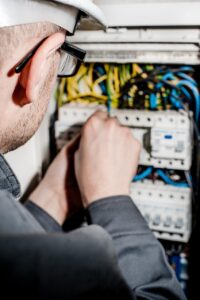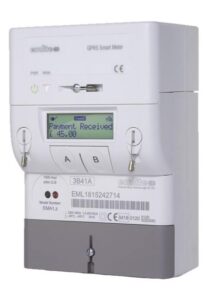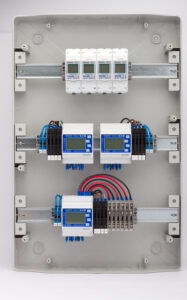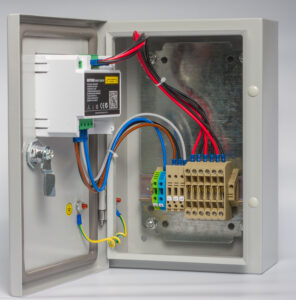Training to become a Smart Meter Installer




Smart meters provide customers with the capability to monitor and regulate their energy consumption in real-time. This empowers them to save money by better management of their their energy usage.
Smart meters also assist utility companies in overseeing power grids, and this helps them to perform repairs, as well as minimising downtime.
If you are interested in training to become a Smart Meter Installer , informing yourself about this is a great start. In this post, we look at the opportunities and job outlook for smart meter installers.
Reasons to become a Smart Meter Installer
- Job growth and demand: The installation of smart meters is a rapidly growing field, driven by government initiatives and utility companies’ efforts to modernize their infrastructure. This creates a high demand for skilled professionals in this area, offering good job prospects and potential career advancement.
- Technological advancement: Smart meters are a part of the growing trend of smart grid technology, which aims to improve energy efficiency, reduce costs, and enhance the overall reliability of the electrical grid. By becoming a Smart Meter Installer, you’ll be at the forefront of this technological advancement, gaining valuable skills and expertise in a cutting-edge field.
- Environmental impact: Smart meters play a crucial role in promoting energy conservation and sustainability. They enable consumers to monitor their energy usage in real-time, leading to greater awareness and potential energy savings. By installing smart meters, you can contribute to reducing carbon footprints and promoting a more sustainable future.
- Variety of work settings: Smart Meter Installers typically work in diverse environments. You may find yourself installing meters in residential homes, commercial buildings, or even industrial facilities. This variety can provide an exciting and dynamic work experience, where each installation presents unique challenges and opportunities.
- Hands-on and technical work: If you enjoy working with your hands and have an interest in technology, becoming a Smart Meter Installer can be a fulfilling career choice. The job involves physical installation, wiring, and configuration of smart metering systems, requiring technical skills and problem-solving abilities.
- Job security: As the world becomes increasingly focused on energy conservation and grid modernization, the demand for smart meter installers is expected to continue growing. This can provide a sense of job security, knowing that your skills will remain in demand for the foreseeable future.
- Potential for advancement: Starting as a Smart Meter Installer can open doors to various career paths within the energy sector. With experience and additional training, you may progress to roles such as project management, system integration, or even leadership positions within utility companies or technology providers.
- Competitive compensation: Smart Meter Installers often receive competitive salaries and benefits, especially as the demand for skilled professionals in this field increases. This can provide a stable income and financial security.
How to become a smart meter installer
Some things to do if you want to become a smart Meter Installer:
1. Training in meter installation
You do need training to install meters. A level 2 diploma in gas installation, a level 2 diploma in electrical installation or a T level in building services engineering for construction. Another option would be to complete an apprenticeship as a dual fuel meter installer or to apply for trainee positions at electricity and gas companies. College courses, apprenticeships and trainee employers typically require between two and five GCSEs, including maths and English.
2. Acquire smart meter certifications (optional)
Going the extra mile and sitting the smart meter electrician exam will help you gain a smart meter installer certification.
Although not strictly necessary, because you will already have other electrician qualifications, this certification will help you stand out, as well as reassuring customers that you do have the necessary skills to perform meter fittings accurately.
3. Keep on top of Metering Trends
This is beneficial and will help you to know the latest smart meter technology, and the application of it. You will know the newest methods and products and include these in the services that you provide to customers.
Jobs related to meter installation in the UK and expected salaries, according to ‘Indeed’
1. Maintenance technician
National average salary: £28,903 per year
Primary duties: A maintenance technician’s job may involve installing smart meters, checking that they’re working or repairing them. This is because their primary responsibility is to ensure that the building they’re working in is in good condition and safe for people to use. They do this by cleaning, repairing and maintaining equipment. This can include anything from servicing smart meters to fixing a broken light fixture. A maintenance technician also helps when there’s an emergency. A maintenance technician’s job can be dangerous because they’re often working with heavy machinery, hazardous materials such as chemicals, and electricity.
2. Dual fuel meter installer
National average salary: £30,881 per year
Primary duties: A dual fuel meter installer is the person who installs, maintains and repairs gas and electricity meters. This means that they’re responsible for installing the meters and sending the readings to your utility company. They also instal new meters, including smart meters, for both gas and electric appliances. They do this by connecting the devices together so that they can read both types of meters at once. The difference between a smart meter installer and a dual fuel meter installer is that the former specialises in installing smart meters, whereas the latter can instal other types.
Related: What are trades jobs? (With types of jobs and salary info)
3. Energy consultant
National average salary: £30,275 per year
Primary duties: An energy consultant might recommend installing smart meters because they can help customers save money on their utility bills. This is because smart meters can automatically track and report on the amount of electricity or natural gas your home uses so that customers always know how much they’re spending. This is helpful when creating a budget, for example.
Energy consultants may also recommend installing smart meters as they allow customers to compare their usage against publicly available data from other homes in their area, which is another way of helping them identify ways to reduce their usage and save money. The role of energy consultant is a career progression option for smart meter installers.
How much do smart meter installers earn?
Salaries for a smart meter installer largely depend on their skills, qualifications, experience, and additional certifications. It may also vary based on whether the employer is a public or private entity. The national average salary for a smart meter installer is £32,928 per year. The national average salary for a senior installer is £36,666 per year. This reflects a typically 40-hour work week, though sometimes as a smart meter installer you may work on weekends.
Ultimately, the decision to become a Smart Meter Installer depends on your interests, career goals, and the opportunities available in your area. Consider exploring the specific requirements, training programs, and job prospects in your area to make an informed decision.